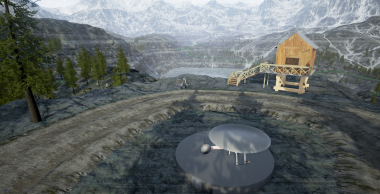CRAM at SHERPA EU project review
Our FP7 project, SHERPA, came to an end with a final review between 1st and 3rd March in Davos, Switzerland.
We had the chance to demonstrate our HMI-enabled high-level planing and reasoning in a wide-area rescue scenario, where CRAM was used as a reactive planner and an executive.
The hardware was simulated using the Unreal game engine with a ROS interface and our RoboSherlock perception system took care of the vision.
The demonstration has received very positive feedback from the reviewers and partners. We thank all of the contributors for this successful project!
(Post originally from IAI blog)
Autogenerated API documentation for CRAM Plan Language
There is a new reference manual for the cram-language ASDF system! Check it our here. More autogenerated API to come.
New Release (v0.2.1)
We have officially switched to CRAM v0.2.1!
Check out the updated Installation Guide to try it out and go through the updated and improved Tutorials to see what's new.
The Migration Guide will help porting your existing code base to comply with the new CRAM version.
The codebase is hosted under cram2 GitHub organization.
The development will continue under the master branch and the (more or less) stable releases will be marked with Tags.
Successful demonstration by bachelor project SUTURO
Our bachelor project SUTURO is making excellent progress: The project, partly self-organized by 14 Bachelor students, aims at teaching a PR2 robot to tidy up a kitchen. This involves very challenging tasks in robot perception, manipulation and grasping, task-level coordination and knowledge representation to recognize objects, infer where they shall be put, and interact with them in the appropriate way.
In a recent demonstration, the robot was able to identify the objects in front of it, infer if they are food or not, and sort them into the correct box. This demonstration was based on software developed by researchers at the IAI that has successfully been adapted and integrated by the project participants.
CRAM is being used in this project to manage high level planning and execution tasks, and to connect the abstract high level plans to actual robot control mechanisms.
Google Summer of Code 2014
The Institute for Artificial Intelligence, University of Bremen, is now a mentoring organization for the Google Summer of Code 2014 program.
This includes two assignments that use CRAM to design and test plan library and reasoning components using virtual environments, and different robots:
- The PR2 robot by Willow Garage and
- The REEM robot by PAL Robotics
The full application and details on the proposed ideas can be found here. If you are interested in working on writing robust robot plans and develop reasoning mechanisms for robotic agents to be more situationally aware, don't hesitate to apply as a student.
Further information about the institute, the topics, and application details can be found on the IAI website.
If you are interested in applying for a proposed topic, just apply.








